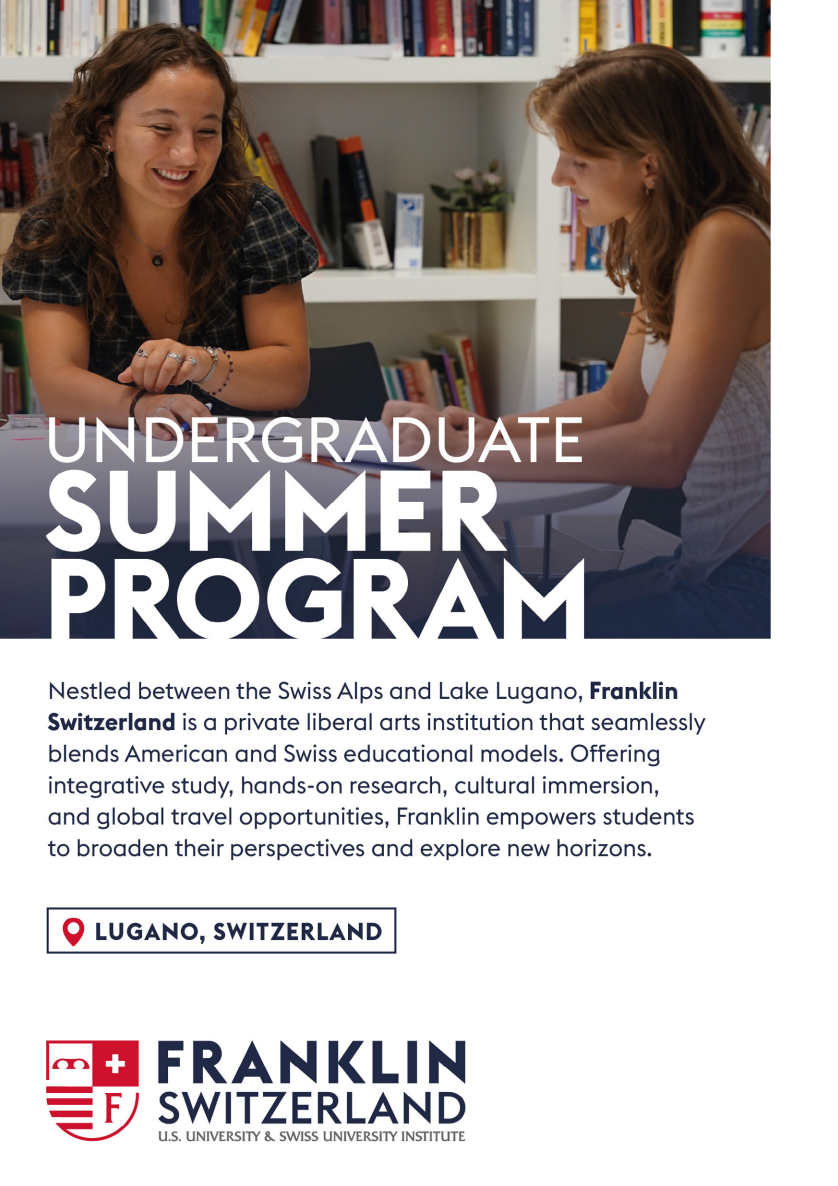EXPERIENCE AN UNFORGETTABLE SUMMER AT FRANKLIN UNIVERSITY SWITZERLAND!
Spend the summer in Lugano, where academic excellence meets stunning natural beauty. Franklin University Switzerland offers two 4-week sessions designed to broaden academic horizons, enhance skills, and provide valuable course credits.
For those seeking a more immersive, hands-on approach, 2-week intensive courses offer focused study experiences that bring learning to life through real-world applications.
Beyond the classroom, summer in Lugano is filled with opportunities for exploration and discovery. From visiting UNESCO World Heritage sites and touring Swiss chocolate factories to cruising the lake and enjoying vibrant food and music festivals, every moment is an opportunity to experience the best of Switzerland.
Join us this summer and make Switzerland your classroom!
EXPLORE OUR FULL COURSE LISTINGS
During the summer session at Franklin University Switzerland, we offer a wide array of individual courses across various disciplines. Whether you're interested in advancing your language skills, delving into European studies, or exploring other academic areas, our summer program provides the flexibility to create a summer experience that aligns with your personal and academic goals.
*Dates for these Interim Session courses do not coincide with the regular session dates. Plan your schedule accordingly with your advisor.
Explore the 2026 Summer Session 1 and 2026 Summer Session 1 Intensive courses.
For course descriptions, click the course code below.
Students enrolled in a 4-week session may select a maximum of two courses.
SESSION 1 INTENSIVE (JUNE 2 - JUNE 12 2026)
The following courses are available only during Sessions 1 Intensive:
- BUS 217: The Business of Food and Drink in Ticino
- CLCS 204: Story-Making Material: Creative Commerce in Switzerland
Explore the 2026 Summer Session 2 courses.
For course descriptions, click the course code below.
Why Choose Franklin for Your Summer Study?
- Rigorous Academic Environment: Challenge yourself with our academically stimulating courses.
- Hands-On Experiential Learning: Connect classroom knowledge with real-world experiences through Academic Travel and project-based learning.
- Global Focus: Enhance your international awareness by engaging with critical global issues.
- Cross-Cultural Immersion: Join a diverse community of students and faculty from around the world.
- Earn Valuable Credits: Advance your undergraduate studies with summer credits.
Dynamic Summer Sessions
Our undergraduate summer programs begin in early June and run through the end of July, featuring two 4-week sessions and two intensive 2-week sessions. These sessions are about learning in a vibrant, cross-cultural community, with courses delivered by our faculty and esteemed guest lecturers.

SUMMER PROGRAMS CALENDAR
Interim Session 1: 19 - 29 May 2026
|
Interim Session 1 Intensive: 19 May - 12 June 2026
|
Summer Session 1: 2 - 25 June 2026
|
Summer Session 1 Intensive: 2 - 12 June 2026
|
Summer Session 2: 30 June - 23 July 2026
|
Please note: Calendar dates are binding. Late arrivals and early departures are not permitted.
Join Us This Summer
Are you ready to transform your summer into an extraordinary educational adventure? Contact us to find out more about our summer programs and how to enroll. Experience the unique blend of academics, travel, and cultural exchange at Franklin University Switzerland this summer. Your academic journey awaits!
Experience an unforgettable summer at Franklin University Switzerland, where academic excellence meets the vibrant culture of Lugano and the Ticino region.
During summer, Lugano and the Ticino region come alive with a variety of exciting events and outdoor activities that make summer in Switzerland truly special.
Some examples?
- Sun Valley Festival: Dance to electronic beats in a breathtaking open-air setting.
- Streetfood Festival in Locarno: Savor delicious global cuisines from food trucks and pop-up stands.
- Beach Festival in Ascona: Celebrate summer with music, sports, and entertainment by the lake.
- LongLake Festival: Enjoy concerts, theater performances, art installations, and cultural events throughout Lugano.
- Saturday Markets: Explore fresh produce, artisan crafts, and local delicacies in Bellinzona, Ponte Tresa, or just across the border in Como.
- Outdoor Adventures: Hike the scenic trails of Mount San Salvatore and Mount Brè, or take a refreshing swim in the crystal-clear lakes of Ticino.
By joining Franklin this summer, you’ll expand your academic horizons while immersing yourself in the dynamic events and natural beauty that make this region a true summer paradise!

Tuition & fees
For a summary of tuition and fees see Tuition (U.S./Canada | Swiss/EU/EEA | International).







